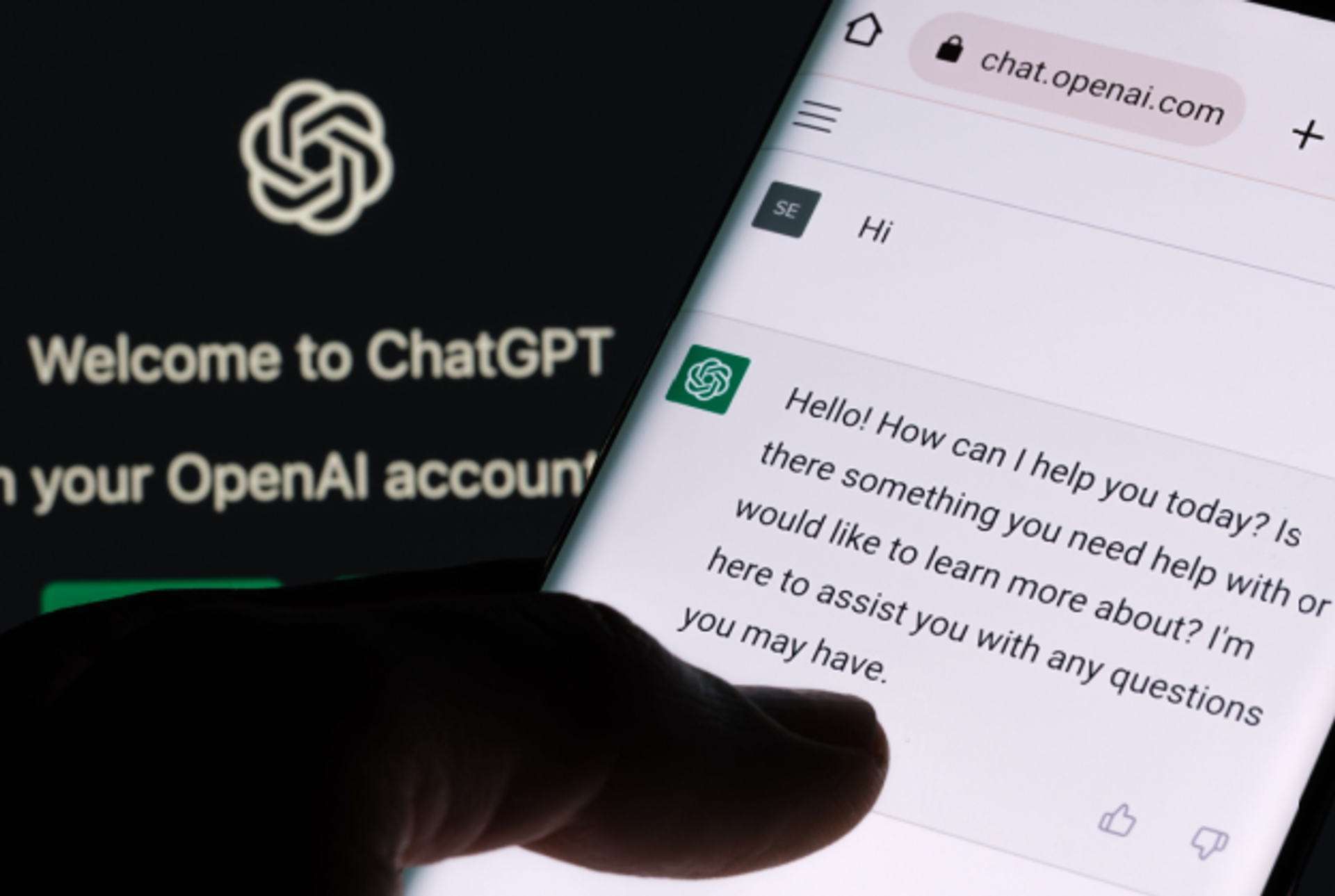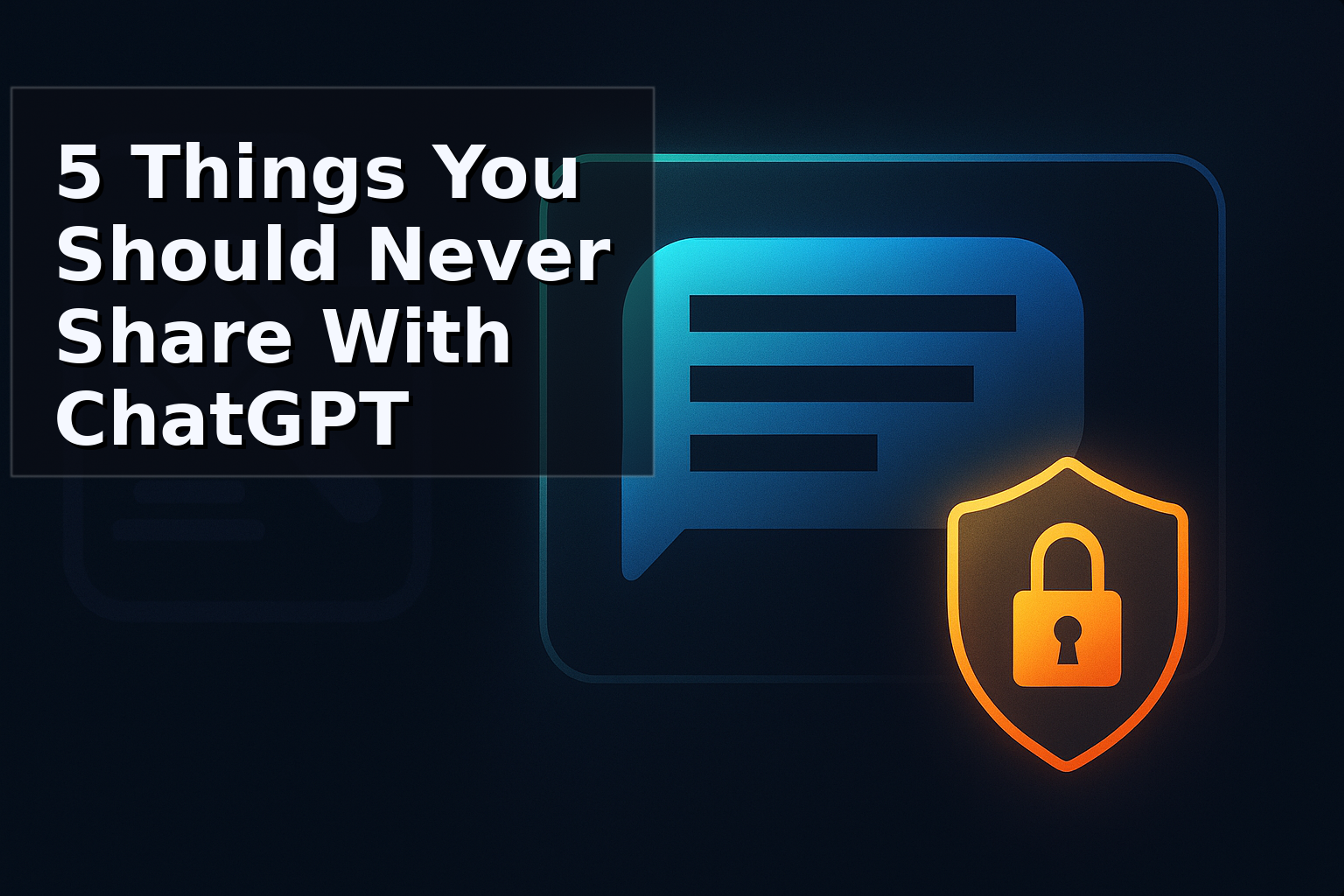
AI assistants are everywhere. They help us draft emails, plan trips, debug code, and think through problems at 2 a.m. Tools like OpenAI’s ChatGPT are fast, helpful, and shockingly capable at times. They can hold a conversation, answer questions, and surface insights in seconds. All true.
Also true: they aren’t your confidant, your b1ank, or your lawyer. The rule of thumb is simple: if sharing a piece of information would make you nervous on a public forum, don’t paste it into an AI chat window.
To make that real, here are five categories of information you should never share with ChatGPT. These aren’t theoretical scare stories. They’re basic hygiene for protecting your identity, your money, your reputation, and your competitive advantage.
1. Personally Identifiable Information (PII)
PII is anything that can uniquely identify you: full name, date of birth, government ID numbers, home address, phone numbers, personal email addresses, passport details, driver’s license scans, and similar. Even harmless combos can triangulate your identity when stitched together.
Why this matters: even if an AI platform doesn’t intend to store sensitive data forever, your messages travel through systems that can be logged, cached, or accessed by people who shouldn’t see them. The gravity of sharing PII with ChatGPT cannot be overstated. Software gets breached. Endpoints get infected. Phishing gets smarter. Once PII leaks, it doesn’t go back in the bottle. The downstream problems are the usual greatest hits - identity theft, new credit lines opened in your name, SIM swaps that let attackers intercept one-time passwords, and account takeovers that blend just enough real data to fool the low level bank employee.
2. Financial and Banking Information
This category is even tighter. Never share card numbers, CVVs, bank account numbers, routing codes, UPI IDs paired with PINs, net banking credentials, brokerage logins, or screenshots that reveal balances and account identifiers. Don’t paste OTPs. Don’t paste statements. Don’t paste invoices with full details.
Why this matters: your financial info is liquid. If someone gets enough of it, money moves. The worst-case scenarios are obvious - fraudulent charges, emptied accounts, or a chain of “test transactions” that escalate while you sleep. Even if you catch the fraud quickly, recovery is a pain, and the stress tax is real.
Common mistakes to avoid:
- “Can you categorize these transactions?” followed by a full CSV export with account numbers embedded.
- “Is this card number valid per Luhn?” Don’t test anything real.
- “Help me log in, here’s my password hint and the last 8 digits of my account.” No.
Do this instead:
- For budgeting or categorization, share synthetic or scrubbed data. Replace real account numbers with masked tokens and tweak amounts so they’re not traceable to your exact life.
- Use your bank’s official tools for uploads, categorization, and reconciliation. If you want AI help, use providers that are purpose-built for finance and offer proper security, not a general chat window.
Bottom line: if it can move money, don’t type it.
3. Passwords and Login Credentials
Passwords and login credentials serve as the digital keys to our online identities and personal information. Sharing these sensitive access details with ChatGPT or any other AI system poses a significant risk. Sharing this type of confidential data opens the door for unauthorized access by malicious entities.
Why this matters: credentials get reused, stored, and leaked. Even if a chat transcript is private today, it can be exposed tomorrow through a breach, a sync to an unsecured device, a shared account, or a bad extension. Attackers don’t need perfect information - they just need one slip.
Hardening tips that actually move the needle:
- Unique passwords for every account. Use a password manager to generate and store them.
- Turn on two-factor authentication everywhere, preferably with an authenticator app or a hardware key. SMS is better than nothing but vulnerable to SIM swaps.
- Rotate secrets. If you ever suspect an API key or token touched an untrusted surface, revoke and reissue it.
- Never test secrets “just to see.” If you want to learn about OAuth flows or JWTs, use dummy tokens or sandbox docs.
4. Private or Confidential Information
Sharing private or confidential information with ChatGPT can have severe implications, both on a personal and professional level. AI systems lack the contextual understanding that humans possess, making them more susceptible to accidental disclosure of sensitive content. Revealing personal secrets, intimate details, or confidential work-related information to AI systems can lead to unintended exposure, compromising our privacy and reputation. In professional settings, divulging sensitive business information can lead to breaches of trust, potential legal issues, and harm to an organization’s competitive advantage.
This matters because: AI systems don’t have human context, and they can’t promise perfect containment. Accidental disclosure is a real risk. At work, sharing confidential material in the wrong place can violate NDAs, trigger compliance issues, or simply hand competitors insight they didn’t earn. At home, once a private detail is online, you can’t predict where it travels.
Scenarios that feel harmless but aren’t:
- “Rewrite this paragraph from our unreleased press release.” Now your embargoed news is on a third-party system.
- “Summarize this board deck.” That deck is probably full of material nonpublic information.
- “Help me write a message about my relationship issue,” followed by names, dates, and screenshots.
Safer patterns:
- Anonymize and generalize. Strip names, dates, and unique identifiers. Change specifics enough that the content can’t be traced back to a person or company.
- Use enterprise-grade tools with strong data controls if your organization approves them for confidential use. Many companies deploy internal AI with strict retention and isolation policies. Use those, not your personal account.
- For personal matters, write in abstractions. You can get good advice without naming names or sharing screenshots.
Bottom line: if a leak would sting, don’t paste the thing.
5. Proprietary or Intellectual Property
Your IP is your moat. That includes code you’ve written, product concepts, algorithms, design systems, unreleased creative work, trade secrets, and research that gives you an edge. Do not share it in a general AI chat, even for harmless-seeming asks like “improve this function” or “polish this concept.”
Why does this matter? - once proprietary content leaves your controlled environment, you lose visibility. You may violate your own policies or those of your clients. You might create headache-inducing questions about ownership, provenance, or confidentiality. And you could help a competitor by accident.
Better paths:
- Use internal code review tools or approved enterprise AI that your legal and security teams have cleared.
- For brainstorming, describe problems rather than dumping source material. “We need a faster way to deduplicate user events at scale” is fine. Pasting the actual event schema and internal heuristics is not.
- Keep a clean separation between public prompts and private assets. If in doubt, don’t share.
The Bigger Picture: Data Security Isn’t Optional
Step back and the theme is simple: the more powerful and convenient our tools become, the more careful we need to be about what we feed them. Data breaches are not rare. Attackers constantly look for weak links - outdated browsers, rogue extensions, exposed tokens, misconfigured cloud storage, or just someone pasting something sensitive into the wrong window.
And yes, AI platforms can be targeted too. There have been cases where account credentials were compromised and resold. From June 2022 to May 2023, over 100,000 ChatGPT account credentials belonging to paid users were reportedly harvested and sold on dark web marketplaces. That’s a reminder that even “smart” platforms sit on top of the same messy internet as everything else.
What to take from that:
- Assume nothing is immune. Convenience does not equal invincibility.
- Your behavior is a major control surface. Good habits cut risk dramatically.
- The cost of caution is low. The cost of a leak is not.
Practical Guardrails You Can Apply Today
You don’t need a security team to raise your baseline. Adopt these habits and you’ll dodge most self-inflicted wounds.
- Treat chats as public by default. If it would embarrass you or hurt you on a billboard, don’t type it.
- Use placeholders religiously. Swap sensitive fields for [TOKEN] markers when you need help formatting or rewriting.
- Keep your personal & work world separate. If your company provides an approved AI tool with data retention controls, use that for work material. Don’t mix accounts.
- Lock down your browser. Remove sketchy extensions, keep the browser updated, and use separate profiles for personal & work.
- Rotate and revoke. If you ever paste a secret by mistake, revoke it immediately. Don’t wait.
- Prefer uploads to pastes for structured tasks. When a trusted, approved tool offers a secure file upload with clear data handling, it’s often safer than dumping raw text into a chat.
- Be skeptical of “just this once.” That’s how most breaches start.
“But I Need The AI To See Real Data”
Sometimes you genuinely need help with content that feels sensitive - a contract clause, a spreadsheet formula, or a paragraph from a medical paper. You can still get value without crossing lines.
- Redact specifics. Dates, names, amounts, identifiers - strip them. The model doesn’t need the real value to explain a formula or rephrase a clause.
- Work with patterns. Describe the structure of your data instead of the data itself. “I have 3 columns: Date, Merchant, Amount. I want a formula to flag duplicates within 7 days” is enough to get a correct answer.
- Use approved, enterprise instances. If you’re in a regulated industry or handling customer data, talk to your security team about sanctioned tools. There’s a difference between a consumer chat and a locked-down deployment.
What About “Private Mode,” “No Training,” Or “Incognito Chats”?
Helpful, not magical. Features that disable training or clear history reduce risk, but they don’t change the fundamental truth that your text still hits a remote service. Logs can exist. Admins can access data. Bugs can happen. Use those features, but don’t treat them as a license to overshare.
A Quick Recap
- Never share PII. Your identity is not a prompt.
- Never share financial or banking info. If it can move money, keep it out.
- Never share passwords or credentials. Secrets belong in a vault.
- Never share private or confidential content. If a leak would sting, don’t paste the thing.
- Never share proprietary IP. Your moat stays in your castle.
AI is incredible for speed and leverage. Use it for brainstorming, rewriting, planning, and learning. Keep the crown jewels out of it. That balance lets you enjoy the upside of modern tools without inviting the downside of modern threats.
Final Word
OpenAI CEO Sam Altman has been blunt about this: don’t use ChatGPT as your therapist. There’s no therapist-like legal confidentiality here - and if there’s a lawsuit or subpoena, OpenAI could be required to produce your chats. See the coverage here on Techcrunch and the original Theo Von interview. For a quick rundown, TechRadar also summarizes the privacy risk here.
We live in a copy-paste world, and that can be a superpower or a risk.
ChatGPT can turn a messy idea into a tight plan in seconds. It can’t guarantee perfect secrecy. Your job is to draw the line.
Be generous with ideas. Be stingy with details that could uniquely identify you, unlock your accounts, expose your private life, or hand your hard-won advantage to someone else. That’s the difference between using AI like a pro and using it like a mark.
Protect your identity. Protect your money. Protect your secrets. And keep your prompts clean.

About Ananay Batra
Founder and CEO @ Listnr Inc
Ananay is the Founder & CEO of Listnr AI, he started Listnr with $100 in the bank back in 2020 and scaled it to 3mn+ users across 200 countries and $1.2m in revenue.
https://ananay.ai/